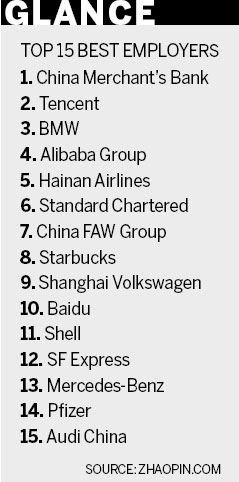当前位置: Language Tips> 双语新闻
Ideal job offers more than money

|
What makes an ideal employer for white-collar employees has changed over the years, a report found. The factors in this changing perception are not all strictly work-related as inflation, general welfare and high property prices also play a role, the report jointly released by Zhaopin.com and Beijing University's Institute of Social Science Survey showed. The annual report was published on Dec 13, together with a list of what are considered to be the top 30 best employers in China. The survey conducted interviews in 2,132 companies in 17 industries, mostly in first- and second-tier cities. "Compared with two years ago, white-collar workers are not just focused on high salaries but want more of a welfare package," said Zhu Hongyan, a senior career consultant at Zhaopin.com, one of the country's biggest job-hunting websites. "They also care more about whether they can get respect, and enjoy good working relationships in the office, rather than simply promotion opportunities, as in the past," she added. Xu Jianhong, 25, graduated from a top university in Nanjing in 2011 and began work at a leading consulting firm in Shanghai. "My salary is considered high compared to my classmates, and that's the main reason I chose the job," he said. "But now I find it not worthwhile as the working hours are too long, and there is no work-life balance. I don't have a hukou (household registration) so I cannot enjoy the benefits that come with it." Xu said that in a year or two, he will consider changing jobs to a more stable company, preferably a State-owned company (SOE) as they have better welfare packages. "I don't regret the choice I made as I acquired a great many job skills and the relationships within the company are good, with no hierarchy, no bureaucracy. We can discuss issues with the big boss anytime," he said, wondering whether any new job would offer such a pleasant environment. "If I change and work in an SOE, I worry that the environment within the company will be different and I will have a hard time getting used to the hidden rules." Xu's opinion was echoed by many of his peers. Liang Lin, 29, graduated with a master's degree in business from a top university. She has changed jobs three times over the past five years, and said her preference has changed as well. "The first job I had was with a US insurance company," she said. "It was good pay but long hours." She wanted a better work-life balance, where she has time to do the things she wants to do. Now she is representing her company, which is an SOE, as it opens a joint venture with a local company in Shanghai. "I have more free time, and I get a good social welfare package," she said. "I can do things I enjoy." Zhu, the career consultant, explained that this change is in line with the theory of Maslow's Hierarchy of Needs. Maslow was a US psychologist who published a well-known paper in 1943 that prioritized human needs. "This shows that an employee needs develop from basic physiological to higher psychological needs, as the theory explained," she said. "Maslow describes this level as the desire to accomplish everything that one can, to become the most that one can be." Zhu also explained that SOEs, as they have a market monopoly in certain industries, can provide employees with better welfare packages, including hukou, medical care, children's education and perhaps housing. That complete package, which is hard to get even if a worker has a high salary, is more attractive nowadays. "As a fresh graduate, I believed that money talked, but now I realize the importance of work-life balance, and the process of self-actualization. To do what you want to do and be allowed to do so is truly a blessing," said Li Xinyuan, who has worked with a US law firm since 2010 after graduating with a law degree from an Ivy-league university in the US. Her monthly income is double that of her peers who work in SOEs but she said she feels that the money alone is not reward enough. Li is thinking of getting a PhD degree and then teaching. "That is more meaningful to me," she said. By Yang Yao ( China Daily) |
记者发现,白领们对于理想工作的看法一直在改变。谁才是最佳雇主呢? 12月13日,北京大学中国社会科学调查中心和智联招聘网发布年度最佳雇主榜单,榜单上列举了中国最受欢迎的30家企业。同时,机构报告显示,受到物价上涨,社会福利待遇提高和高房价的影响,理想工作的影响因素已不仅仅是工资。 这份调查的数据来自于17个行业的2132家公司,这些公司大多位于我国一二线城市。 智联招聘高级职业咨询师朱红艳(音)介绍,与两年前相比,白领们不仅关注高薪,而且还关心公司员工福利待遇问题。他们希望在公司能够得到尊重,与同事之间有着良好的人际关系,而不像以前仅仅希望得到升职的机会。 徐建洪(音),现年25岁,2011年毕业于南京的一所国内一流大学,现供职于上海一家知名咨询公司,他说出了大多数年轻人的心声。 他坦言,他在他的同学中属于高收入,这也是当年选择这份工作的原因,但现在,他对这份工作并不满意,因为工作时间过长,生活没有规律,而且他还无法拥有上海户口,这让他难以享受相应的公共福利。 他说自己想在未来一两年内换一份更加稳定的工作,福利待遇较好的国企是一份不错的选择。 不过,他对自己的选择并不后悔,这两年他在这里积累了很多工作经验,同事间的关系也很融洽。大家经常和公司领导一起讨论问题,没有官僚主义的习气。对于日后到国企工作的选择,他也有一些顾虑,那里的工作环境应该会有所不同,估计得花一段时间去熟悉新的规则。 梁琳(音),现在29岁,工商管理硕士,名校毕业,在过去的五年中换过三份工作,她觉得自己对理想工作的看法也发生了改变。 她说,她的第一份工作是在一家美国保险公司上班,工资很高但是工作时间太长。后来她放弃了那份工作,希望每天过得有规律,过属于自己的生活。现在,她在一家上海的国企合资代表处工作。她感到现在自己有了许多自由的时间,可以做自己喜欢做的事,而且社会福利待遇也不错! 职业咨询师朱红艳认为,这种变化符合美国心理学家马斯洛提出的需要层次理论,这个著名理论于1943在他的论文中问世。根据马斯洛的理论人的需要从低层次的生存需要向高层次的精神需要不断发展,最终达到自我实现。如今,国有企业在一些行业拥有垄断地位,它们可以为员工提供户口、提供医疗保障、解决子女就学问题,甚至有些还能解决住房问题,在当前形势下,这些福利十分诱人,是普通企业提供的高薪所无法比拟的。 李欣源(音),一家美国法律公司的员工,2010年毕业于美国一所常春藤院校。她说,当自己刚刚毕业时,她认为一切靠钱说话,不过现在,她感到有规律的生活和追求自我实现才是最重要的,最幸福的事莫过于能够做自己想做的事了!现在,她的月收入相当于她在国内国企工作的同龄人的两倍,不过钱无法满足精神需求。她正在考虑考博,之后留校教书,对于她而言,那才是有意义的生活。 (翻译:吴溦 编辑:丹妮) |
上一篇 : 别再跟穷孩子说“书中自有黄金屋”
下一篇 : 希拉里:自1996年起不开车
关注和订阅


电话:8610-84883645
传真:8610-84883500
Email: languagetips@chinadaily.com.cn